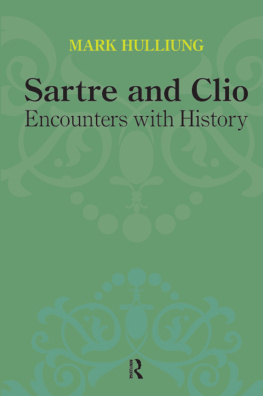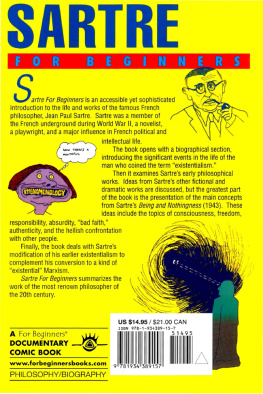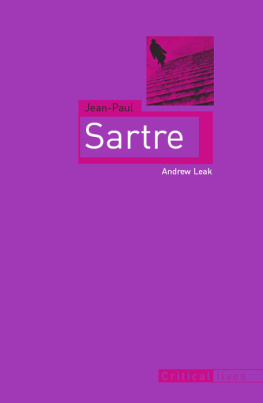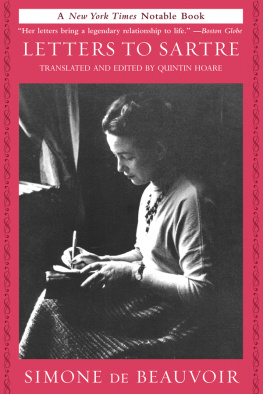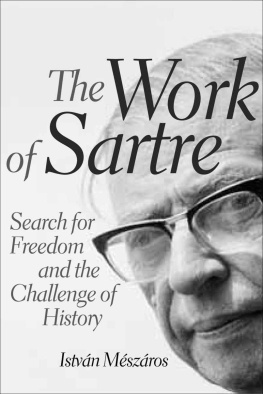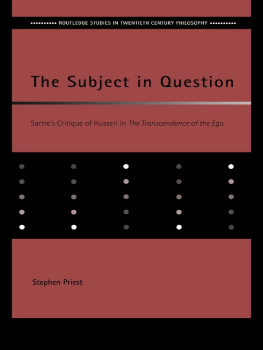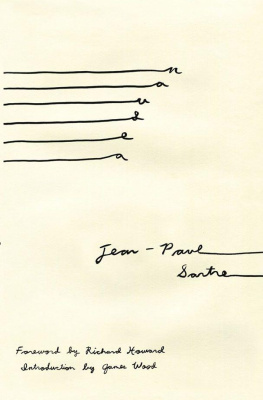
Sartre and Clio
Sartre and Clio
Encounters with History
Mark Hulliung

First published 2014 by Paradigm Publishers
Published 2016 by Routledge
2 Park Square, Milton Park, Abingdon, Oxon OX14 4RN
711 Third Avenue, New York, NY 10017, USA
Routledge is an imprint of the Taylor & Francis Group, an informa business
Copyright 2014, Taylor & Francis.
All rights reserved. No part of this book may be reprinted or reproduced or utilised in any form or by any electronic, mechanical, or other means, now known or hereafter invented, including photocopying and recording, or in any information storage or retrieval system, without permission in writing from the publishers.
Notice:
Product or corporate names may be trademarks or registered trademarks, and are used only for identification and explanation without intent to infringe.
Library of Congress Cataloging-in-Publication Data
Hulliung, Mark.
Sartre and Clio : encounters with history / Mark Hulliung.
p. cm.
Includes bibliographical references and index.
ISBN 978-1-61205-044-7 (hardcover : alk. paper)
ISBN 978-1-61205-045-4 (paperback : alk. paper)
1. Sartre, Jean-Paul, 19051980Political and social views. I. Title.
JC261.S372H85 2012
901dc23
2012019309
Designed and Typeset by Straight Creek Bookmakers.
ISBN 13 : 978-1-61205-044-7 (hbk)
ISBN 13 : 978-1-61205-045-4 (pbk)
To Barbara and Peter the best of friends
Contents
The purpose of this book is to offer a study of the changing role of history in the thought of Jean-Paul Sartre, from Nausea in 1938 to his final writings, with a number of fascinating complications along the way.
My study covers not all but a great many of Sartres writings, as dictated by the theme. It is written in a style that is open to the larger public, not simply the experts. The modest length of my study, the importance of its central concern, and its jargon-free prose will, I hope, invite the maximum number of readers.
Throughout this volume, I have used the standard translations of Sartres works whenever they exist, but I have not hesitated to provide my own revised versions when necessary. When citing a text that has never appeared in English, the translations are my own.
My debts are to the scholars who have preceded me and to the students who have repeatedly reminded me that Sartre still matters.
The vogue of Jean-Paul Sartre may not be what it once was, but as anyone who teaches undergraduates knows, there is no lack of young people who remain enthusiastic about grappling with his writings. A coterie of scholars, too, seems determined to prove that rumors of Sartres intellectual death and irrelevance are greatly exaggerated. Partly this continuing scholarly output is a matter of the successful recovery in recent years of what his biographer Annie Cohen-Solal spoke of in 1985 as the thousands of his pages scattered around the world. Even more, his refusal to disappear is attributable to the reality that, love him or hate him, one cannot deny him admittance to the ranks of the great minds of his century. Sartre remains a figure of keen interest.
Is there anything new to say about Sartre? There is and will continue to be because new perspectives can always be brought to bear upon familiar materials. What I shall attempt is a study of the changing role of history in his thought, from Nausea in 1938 to his final major efforts, the two-volume Critique of Dialectical Reason and the multivolume study of Flaubert, Idiot of the Family, with many unexpected, perplexing, and fascinating stops, reversals, and zigzags along the way. While many secondary works on Sartre touch on my topic, their focus is elsewhere. Despite the wealth of the secondary literature, I believe there is something to be said about Sartre that is new and significant.
He also declared that to write history and to be engaged politically were intimately interrelated activities, a fusion of theory and practice. Sartre began by repudiating Clio and ended by embracing her, eventually asking far more of the study of history, it seems, than any other thinker of his age or more recent times.
It would be a mistake, however, to conclude that a line of development runs straight and true from Nausea in 1938 to the Critique in 1960. Sartres encounter with Clio was an on-again, off-again affair, a stormy relationship with many break-ups and an unsatisfying finale. Only posthumously, in 1985, was the long-awaited sequel to volume one of the Critique of Dialectical Reason released, and then in a frustratingly truncated, imperfectly organized form. Of the Critique, it may be argued that of all his unfinished projects this was one he simply had to bring to fruition, that his lifes work was seriously incomplete in its absence. Why two decades after publication of the first volume was the second Critique unfinished and misshapen? How did it happen that a book he had already sketched in 1958, two years before the appearance of volume one, and that he announced in 1959 would be released within a year, remained incomplete in 1980, the year of his death?
If failure to finish the Critique is one measure of Sartres difficulties in coming to terms with historical reason, another is his long record of advancing the study of history in some publications while simultaneously seeking to write history out of his work in others. On the one hand, there is the Sartre who, after elaborating his method of existential psychoanalysis in Being and Nothingness (1943), called upon it when he decided to write history in the form of biographies of Baudelaire and Jean Genet, an interest that began during World War II and that he carried with him to his dying day, still working at the end of his life on the finale to his massive biographical study of Flaubert (below, , From Time to History).
On the other hand is a contrasting Sartre who is likewise a product of the immediate postwar era and a forceful presence in his thought for many years thereafter. Quite striking is this second Sartres protracted fascination with groups that, he believed, have been denied a history: the French during the German occupation, Jews throughout the centuries, the French proletarians , The Historical Search for the Unhistorical). The reason he was so fascinated with these victims, caught in repetition and denied a past, is perhaps not impossible to discern. Very likely it was because he believed that if anyone was likely to heed the call to authenticity it was these groups, facing hopeless or seemingly hopeless odds, yet fortunately denied by their misfortunes the temptation of members of other groups to lose themselves in the past. Unlike the rest of us, members of these groups, standing outside history, were forced to face up to the choice between authentic and inauthentic existence.
In the (Human History and the Human Condition), we shall discuss yet another reason why Sartre was sometimes reluctant to follow the path to history and all-out historicity. Along with Albert Camus, Sartre vehemently rejected humanism in his earlier writings, only to reinstate it in revised form as World War II drew to a close. Soon, this revisiting of humanism included a reworking of the notion of the human condition, which figures prominently in the French intellectual tradition from Montaigne and Pascal to Malraux and beyond. Although there is no human essence or human nature, there is a fixed, static, unchanging human condition in which time may matter, as in Beckett and Sartre, but history does not. A tension in Sartres thought arguably exists between his attraction to the notion of the human condition and his desire to solve the problem of history. That tension was fated to be greatly aggravated when Camus called on his understanding of the human condition to repudiate the French Communist party, the Soviet Union, and their historicist philosophies at exactly the same time that Sartre was entering his most intense period of fellow-traveling.
Next page
